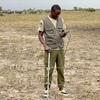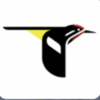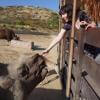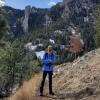With new technologies revolutionizing data collection, wildlife researchers are becoming increasingly able to collect data at much higher volumes than ever before. Now we are facing the challenges of putting this information to use, bringing the science of big data into the conservation arena. With the help of machine learning tools, this area holds immense potential for conservation practices. The applications range from online trafficking alerts to species-specific early warning systems to efficient movement and biodiversity monitoring and beyond.
However, the process of building effective machine learning tools depends upon large amounts of standardized training data, and conservationists currently lack an established system for standardization. How to best develop such a system and incentivize data sharing are questions at the forefront of this work. There are currently multiple AI-based conservation initiatives, including Wildlife Insights and WildBook, that are pioneering applications on this front.
This group is the perfect place to ask all your AI-related questions, no matter your skill level or previous familiarity! You'll find resources, meet other members with similar questions and experts who can answer them, and engage in exciting collaborative opportunities together.
Just getting started with AI in conservation? Check out our introduction tutorial, How Do I Train My First Machine Learning Model? with Daniel Situnayake, and our Virtual Meetup on Big Data. If you're coming from the more technical side of AI/ML, Sara Beery runs an AI for Conservation slack channel that might be of interest. Message her for an invite.
Header Image: Dr Claire Burke / @CBurkeSci

Explore the Basics: AI
Understanding the possibilities for incorporating new technology into your work can feel overwhelming. With so many tools available, so many resources to keep up with, and so many innovative projects happening around the world and in our community, it's easy to lose sight of how and why these new technologies matter, and how they can be practically applied to your projects.
Machine learning has huge potential in conservation tech, and its applications are growing every day! But the tradeoff of that potential is a big learning curve - or so it seems to those starting out with this powerful tool!
To help you explore the potential of AI (and prepare for some of our upcoming AI-themed events!), we've compiled simple, key resources, conversations, and videos to highlight the possibilities:
Three Resources for Beginners:
- Everything I know about Machine Learning and Camera Traps, Dan Morris | Resource library, camera traps, machine learning
- Using Computer Vision to Protect Endangered Species, Kasim Rafiq | Machine learning, data analysis, big cats
- Resource: WildID | WildID
Three Forum Threads for Beginners:
- I made an open-source tool to help you sort camera trap images | Petar Gyurov, Camera Traps
- Batch / Automated Cloud Processing | Chris Nicolas, Acoustic Monitoring
- Looking for help with camera trapping for Jaguars: Software for species ID and database building | Carmina Gutierrez, AI for Conservation
Three Tutorials for Beginners:
- How do I get started using machine learning for my camera traps? | Sara Beery, Tech Tutors
- How do I train my first machine learning model? | Daniel Situnayake, Tech Tutors
- Big Data in Conservation | Dave Thau, Dan Morris, Sarah Davidson, Virtual Meetups
Want to know more about AI, or have your specific machine learning questions answered by experts in the WILDLABS community? Make sure you join the conversation in our AI for Conservation group!
No showcases have been added to this group yet.
finding ecological solutions using sound and conservation tech
- 0 Resources
- 0 Discussions
- 4 Groups
Currently a data scientist in industry working on mechanistic models of risk, previously worked on modeling coral reefs. I am interested in the potential for emerging technologies and new ideas to help us solve environmental crises.
- 0 Resources
- 0 Discussions
- 14 Groups
Fauna & Flora
- 0 Resources
- 3 Discussions
- 10 Groups
- @OakAlice
- | She/her
PhD researcher standardising machine learning approaches for behaviour classification in free-roaming wild animals.
- 0 Resources
- 0 Discussions
- 7 Groups
- @Kasi
- | He/him
Game Rangers International
Kasi Amor Kalande is a young conservationist with experience in elephant movement research, GIS, and conservation technology.
- 1 Resources
- 0 Discussions
- 7 Groups
- @Manahil_ijaz
- | she
I’m a nature enthusiast who loves exploring wildlife and ecosystems. Through my research in ecology, I channel this passion into protecting and preserving biodiversity.
- 0 Resources
- 0 Discussions
- 3 Groups
- 0 Resources
- 0 Discussions
- 4 Groups
- @Doris0511
- | She/Her
Founder of Life on Purpose Detroit, we work with Detroit Youth to learn about technology and conservation.
- 0 Resources
- 0 Discussions
- 3 Groups
- @Phillip_Swart
- | He
I'm a conservationist working in the Vulture conservation space in South Africa with a huge passion for technology.
- 0 Resources
- 0 Discussions
- 17 Groups
- @GrunCrow
- | She/They
Computer Scientist
- 0 Resources
- 0 Discussions
- 10 Groups
- @Prabisha
- | she/her
Dedicated research scientist with over 8 years of experience in cartography, spatial analysis, and statistical modeling to tackle environmental, public health, and socio-economic challenges. Passionate about leveraging geospatial technology to drive impactful solutions.
- 0 Resources
- 0 Discussions
- 12 Groups
- @hannahilea
- | she/her
- 0 Resources
- 0 Discussions
- 6 Groups
This exciting news article about The Global Wetland Project's FishID platform discusses the latest improvements and developments in using deep learning to identify individual fish species underwater. In addition to...
28 July 2020
Article
In this article from BearID Project, Director and Software Developer Ed Miller walks us through using their application to identify individual bears from photographs. Ed shows us how to easily use BearID remotely in the...
21 July 2020
Put your acoustic monitoring skills to the test in The Cornell Lab of Ornithology's Birdsong Identification Kaggle Competition. Participants will compete to identify as many bird vocalizations as possible in in...
8 July 2020
Conservation technology largely consists of two categories: tools to monitor and study wildlife and their habitats, and solutions to mitigate or prevent negative human impacts. The fight against poaching in particular...
4 June 2020
A couple months ago, we introduced you to the Footprint Identification Technique (FIT), a non-invasive way to build an identification algorithm from both wild and captive animals by photographing footprints. Today, we'...
3 June 2020
Funding
The 2020 Hackaday Prize competition has begun! This year, Conservation X Labs has partnered with the Hackaday Prizes as one of four nonprofits seeking tech-based solutions to urgent challenges. Conservation X Labs'...
26 May 2020
Article
We're excited to welcome the WildTrack FIT group to our community! Today, we'd like to introduce you to the Footprint Identification Technique (FIT) and share how you can incorporate this tracking method into your field...
6 May 2020
Funding
Want to compete in the iWildCam 2020 competition identifying species in camera trap images to support biodiversity monitoring efforts and automatic species classification model improvements? Because the Workshop on Fine...
4 May 2020
The 2020 Arm Research Summit is accepting submissions from all research disciplines focusing on the role of technology in solving global challenges. Submissions should reflect the potential of sustainable, secure, and...
24 April 2020
Article
At the 2018 London Illegal Wildlife Trade Conference, we announced the WILDLABS Tech Hub, an accelerator programme created to support the development and scaling of groundbreaking technological solutions addressing the ...
13 April 2020
Community Announcement
Our second WILDLABS Community Call took place on April 1st to continue the discussion started by Ben Tregenna in our Data Science group, in which he suggested the idea of submitting a collaborative entry to the X-Prize...
30 March 2020
Article
At the 2018 London Illegal Wildlife Trade Conference, we announced the WILDLABS Tech Hub, an accelerator program created to support the development and scaling of groundbreaking technological solutions addressing the ...
26 March 2020
August 2025
event
September 2025
event
event
event
event
October 2025
event
event
event
December 2025
event
March 2026
November 2023
October 2023
17 Products
Recently updated products
| Description | Activity | Replies | Groups | Updated |
|---|---|---|---|---|
| Thank you for your reply, ChadI meant 10 as a whole, indeed. Perhaps you see your post in one group, but since it is tagged for all groups, I assumed you meant 10 in total.In your... |
|
Acoustics, AI for Conservation, Animal Movement, Camera Traps, Citizen Science, Climate Change, Community Base, Connectivity, Drones, eDNA & Genomics, Emerging Tech, Funding and Finance, Geospatial, Human-Wildlife Coexistence, Software Development, Wildlife Crime | 1 month 3 weeks ago | |
| Thanks Fadhilla! I met with your colleague Henrick at the booth. :-) |
|
AI for Conservation, Animal Movement, Camera Traps, Citizen Science, Community Base, Data management and processing tools, Early Career, Geospatial | 1 month 4 weeks ago | |
| Thank you for your comment Chris! Using these tools has made a huge difference in the way we can monitor and manage Invasive Alien Vegetation. I hope you are able to integrate... |
|
AI for Conservation, Citizen Science, Conservation Tech Training and Education, Drones, Geospatial, Human-Wildlife Coexistence, Open Source Solutions | 2 months ago | |
| Hi Nick,Thank you for reaching out and for the incredible work you’re doing to spotlight conservation through film. We’d be very interested in learning more about your documentary... |
|
AI for Conservation, Emerging Tech | 2 months ago | |
| I would love to hear updates on this if you have a mailing list or list of intersted parties! |
|
AI for Conservation, Community Base, Drones, Latin America Community, Marine Conservation, Open Source Solutions, Software Development | 2 months ago | |
| Hello, could you please elaborate on what the purpose of this project is? Thanks a lot :) Lukas |
|
AI for Conservation, Emerging Tech, Sensors | 2 months 1 week ago | |
| This survey on camera trap use is a valuable effort to improve data quality and consistency in wildlife monitoring. Looking forward to the results and how they will help shape... |
|
Camera Traps, AI for Conservation, Open Source Solutions | 2 months 2 weeks ago | |
| Ritika, All the best! I hope someone provides a more substantive answer! I have also graduated with masters in AI and ML recently. Difference being I am at the end of my... |
|
AI for Conservation, Software Development | 3 months 4 weeks ago | |
| We’re excited to announce that Deep Voice has received a 2025 Wildlabs Award to develop a public, web-based platform for marine mammal... |
|
Acoustics, AI for Conservation, Marine Conservation | 2 months 2 weeks ago | |
| True, the US ecosystem is a challenging space right now, for basically all sectors. We should not let the US chaos prevent us from engaging with opportunities in other... |
|
AI for Conservation, Camera Traps, Connectivity, Drones, Emerging Tech, Ethics of Conservation Tech, Marine Conservation, Sensors | 4 months ago | |
| Fascinating article, combining machine learning and acoustical signals to correlate coral reef health.https://www.sciencedirect.com/science... |
|
Acoustics, AI for Conservation, Marine Conservation | 3 years 2 months ago | |
| MIT has this Moo Deng-based fun challenge! More seriously it relates to AI and human-nature interaction. I imagine people on Wildlabs would... |
|
AI for Conservation | 2 months 3 weeks ago |












































